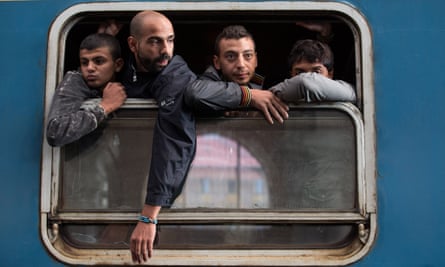France and Germany have called on the EU to force member countries to take obligatory quotas of refugees and asylum seekers.
The German chancellor, Angela Merkel, said the French-German position represented a “sharing of duty … the principle of solidarity” while on a visit to Switzerland on Thursday.
Shortly afterwards, François Hollande, the French president, said there should be a “permanent and obligatory mechanism” for the accepting of refugees. He carefully avoided using the word “quota”.
Tensions between EU member states have risen in recent days as 3,000 people camped outside the Keleti railway station in Budapest hoping to be allowed to travel to Germany following its declaration that Syrians who reach the country will be allowed to stay.

Hungary on Thursday permitted the refugees to enter the station, but police stopped trains short of the Austrian border, prompting fears among those on board that they would be taken to camps nearby. The train was halted by scores of riot police at the town of Bicske, an hour from Budapest, and passengers deemed to be migrants were ordered to disembark.
Hungary has become the focus of EU wrangling over asylum policy as the continent faces its biggest refugee crisis since the second world war. Meanwhile, on the edge of the EU’s borders, the father of a Syrian boy who was photographed lying lifeless on a Turkish beach after his family attempted to reach the Greek island of Kos, said he is preparing to take the bodies of his two sons and wife to be buried in his home town of Kobani.
Abdullah Kurdi said he no longer had any desire to continue on to Europe. Speaking outside the mortuary where the bodies of his two sons were being held, Kurdi said: “I just want to see my children for the last time and stay forever with them.”
The British prime minister, David Cameron, on Thursday spoke of how moved he had been by the picture of three-year-old Aylan Kurdi. He said the UK would “fulfil our moral responsibilities” is expected to announce later that the UK is prepared to accept thousands more refugees from the UN camps on the Syrian border.
Hollande said the bilateral proposal from Germany and France would be considered by the council of European interior ministers on 14 September.
“’What is happening today is not enough and there are countries that are not fulfilling their moral obligations,” Hollande said. “This [Franco-German] initiative involves asking the president of the [European] commission and the president of the [European] council and all our partners, so that we can put in place immigration policies worthy of what we represent.”
The Elysée palace issued a brief statement confirming the proposals, agreed in a telephone conversation between Hollande and Merkel on Thursday morning, and stating the leaders had decided to “take the initiative”.
“The European Union must act in a decisive manner that conforms to its values”, the Elysée statement read. “The men, women and their families who are fleeing war and persecution need international protection and it is their right. The Geneva conventions drawn up after the war are an obligation on all countries. Europe must protect those for whom she is a last hope.”
Attempts to get to grips with the crisis have left the EU floundering and the Schengen passport-free travel zone across 26 countries threatening to unravel.
EU foreign ministers are to meet in Luxembourg on Friday. The German, French and Italian foreign ministers wrote to the chair of the meeting, Federica Mogherini the EU’s foreign policy coordinator, demanding a more equitable distribution of refugees across the union.
The three countries have been urging the same since May, but a summit of EU leaders in June broke up in acrimony at 3.30am without agreement.
The Italian prime minister, Matteo Renzi, said Europe needed to move beyond its emotional response to the migrant crisis and take concrete action to address the humanitarian crisis.
“Europe cannot just get emotional, it has to move,” he said at a press conference in Florence on Thursday, where he was joined by the Maltese prime minister, Joseph Muscat.

Renzi, who has been on the frontlines of the migration crisis, with Italy seeing an influx of more than 100,000 migrants from Africa and the Middle East this year, suggested that the rest of the EU was finally waking up to the scale of the crisis – a problem that the two leaders had been dealing with for months without much support from other EU countries.
“In June it felt like [Malta PM Muscat] and I were asking for who knows what. Others thought it wasn’t a problem, that it was our fixation, our gripe. Now that the problem is everyone’s we’re asking for more reason, more common sense,” he said.
He added that it was Europe’s duty to develop a single response to the crisis and criticised leaders who believed “one can just shut their doors in the global world”. “The idea that I can do what I want and lock myself in doesn’t make sense,” he said.
Renzi has pleaded for more support and help to address the situation for months, without tangible results. At the heart of his argument is that European unity is at stake if the arrival of refugees on Italian and Greek shores continued to be seen as a local, rather than a Europe-wide, problem.
Separately, Médecins sans Frontière, the medical aid group that has been helping to save and treat migrants making the treacherous journey across the Mediterranean since May, said it had its “busiest day ever’ after it rescued 1,658 people on Wednesday in conjunction with another aid group, Migrant Offshore Aid Station (MOAS).
It said the people it rescued in six separate operations were primarily from Eritrea, Nigeria, and Somalia and included 199 children and 547 women. One was a pregnant woman who went into labour after being transferred to an MSF boat.

Comments (…)
Sign in or create your Guardian account to join the discussion